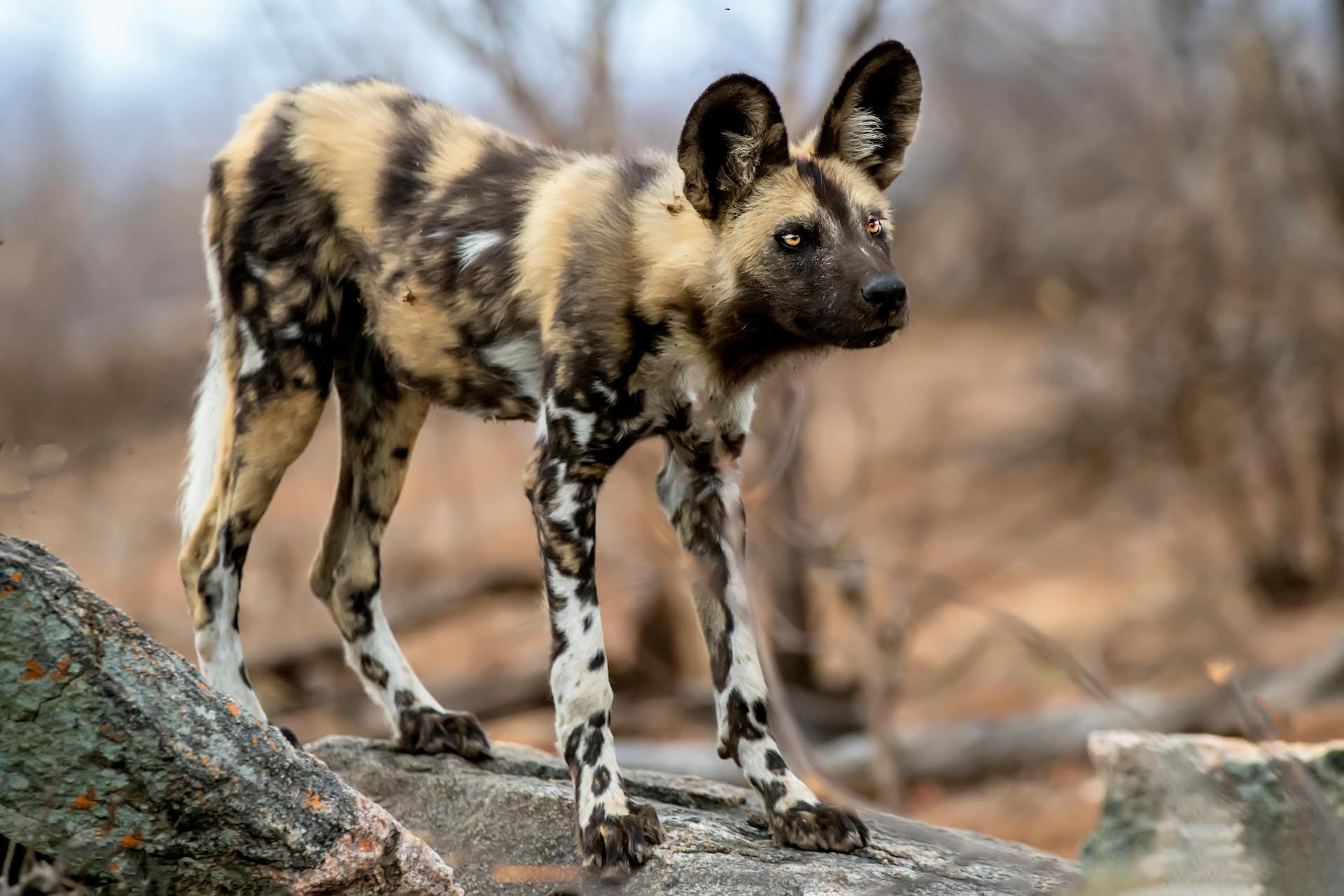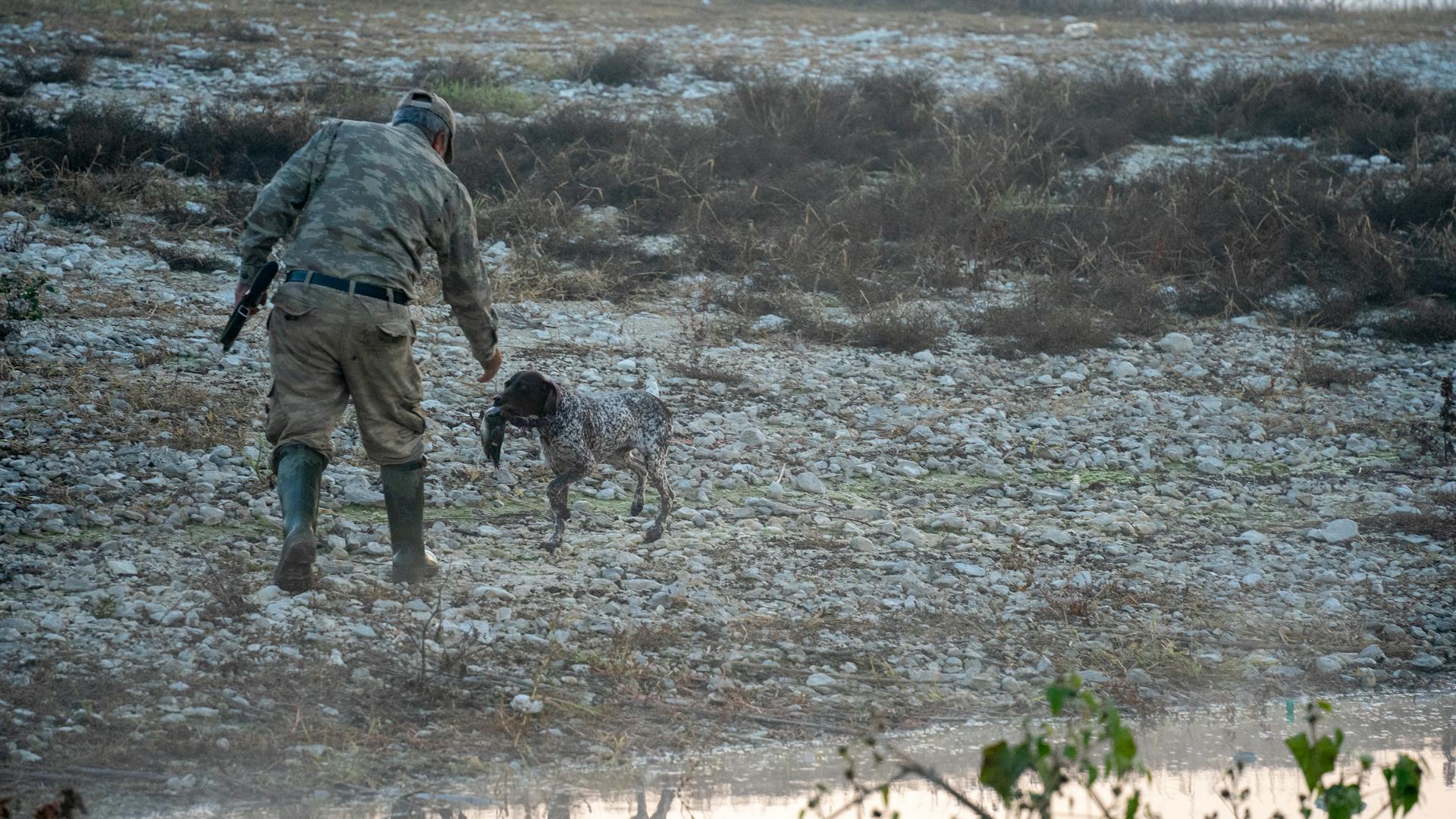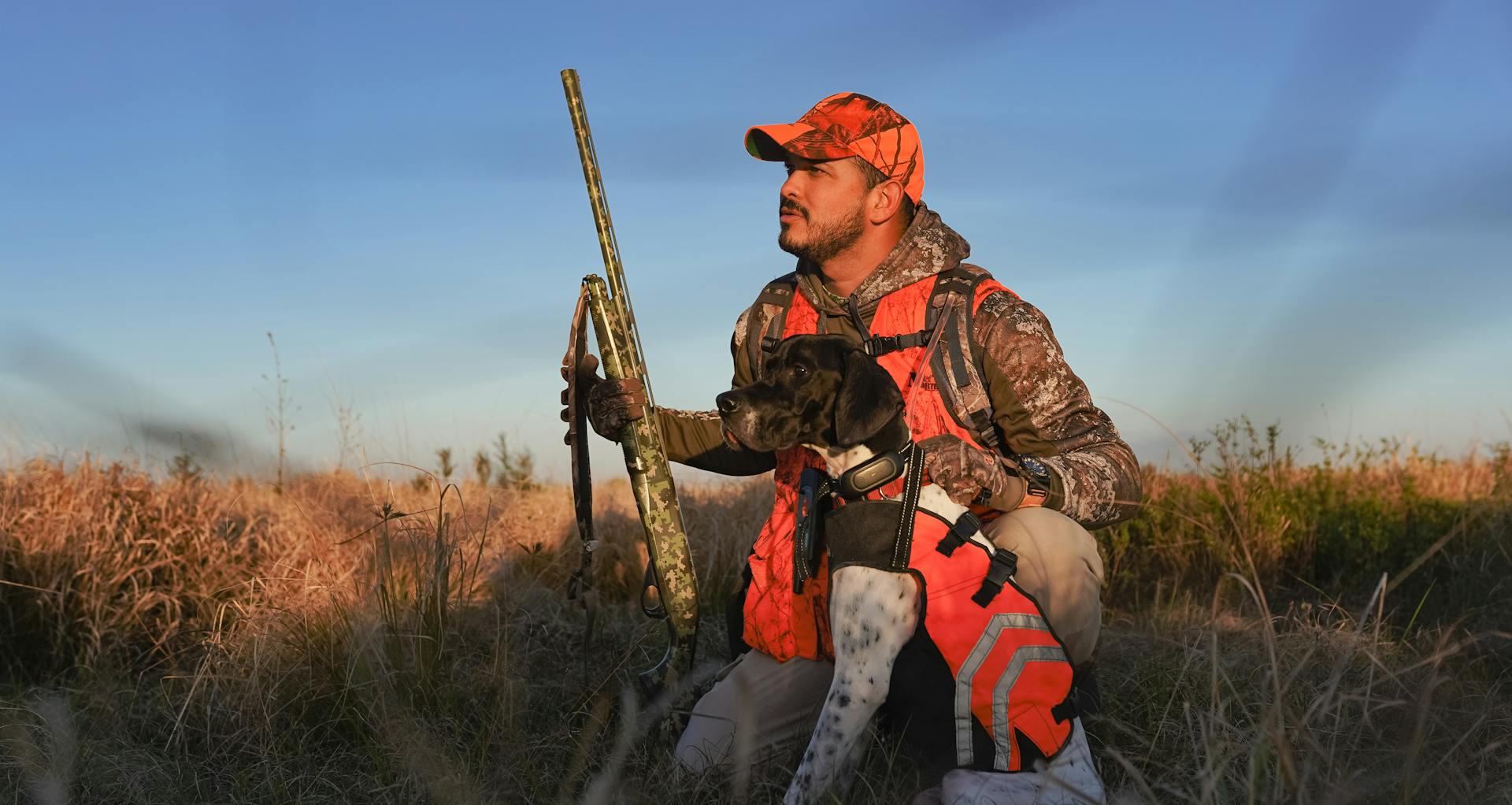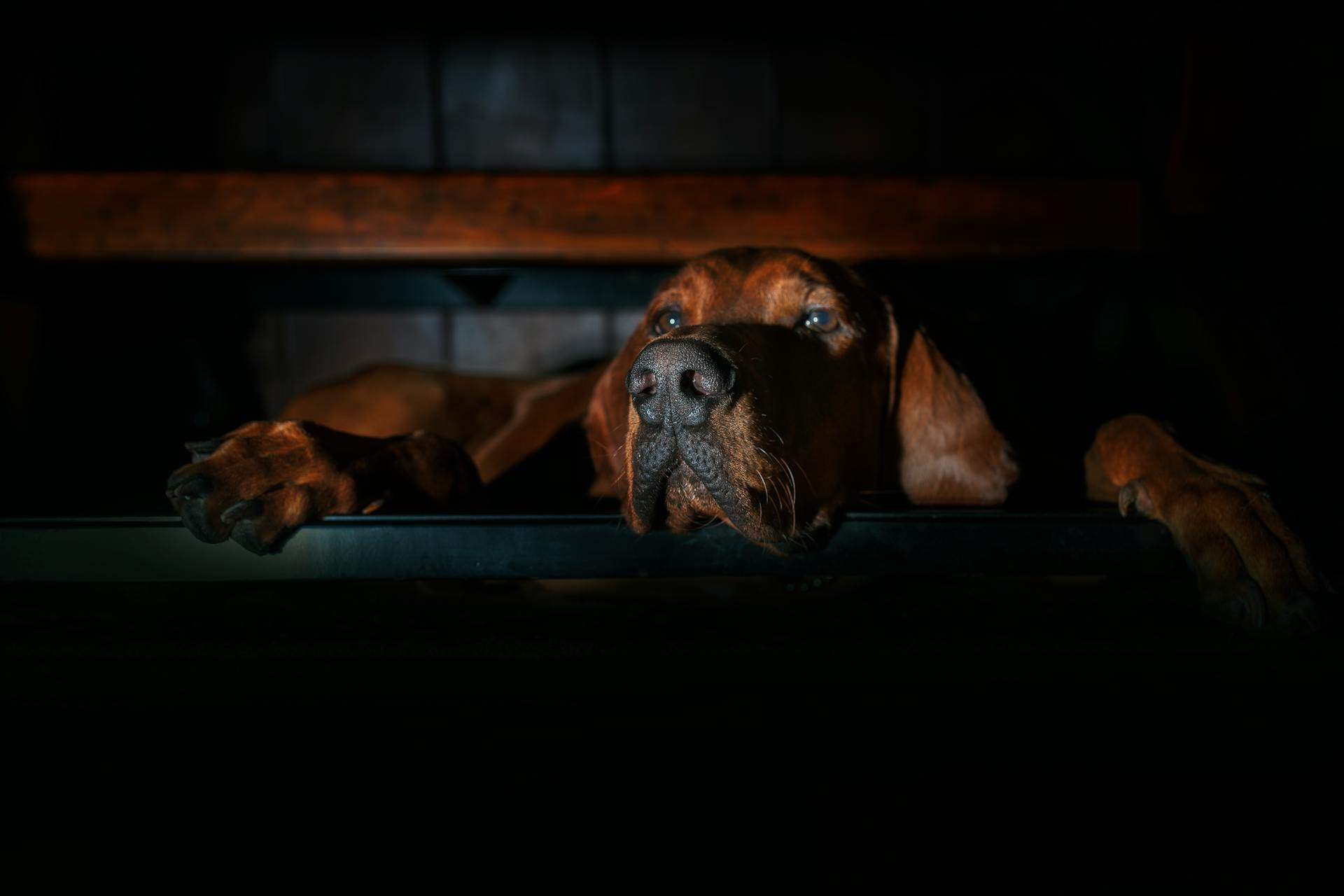
The Redtick Coonhound is a unique and fascinating breed that's perfect for active families or hunters. They're a medium-sized dog with a short, smooth coat that's a distinctive tri-colored pattern of red, black, and white.
Their athletic build and strong instinct to chase make them well-suited for hunting small game, particularly raccoons. Their keen sense of smell and endurance also make them valuable companions for outdoor activities.
Despite their energetic nature, Redtick Coonhounds are also loving and gentle, making them great family pets. They thrive on attention and exercise, so be prepared to spend quality time with your Redtick Coonhound every day.
With proper training and care, a Redtick Coonhound can live a long and healthy life, typically ranging from 10 to 12 years.
Physical Characteristics
Redtick coonhounds are a medium to large breed, with males typically standing between 24 to 26 inches tall.
Their height can vary slightly, with females usually coming in at 23 to 25 inches tall.
Personality and Temperament
Redtick Coonhounds are people-loving dogs that thrive on being around their families and other dogs. They can become anxious if left alone for long periods, so it's essential to provide them with plenty of attention and exercise.
This breed has a unique personality that changes depending on whether they're hunting or relaxing at home. When they're off-duty, they're often calmer and more mellow, but when they're hunting, they can become stubborn and goal-oriented.
Redtick Coonhounds are sweet but determined dogs that need plenty of mental and physical stimulation to prevent boredom. They generally get along with other dogs and some cats, but can be reserved with strangers and children.
One of the key characteristics of Redtick Coonhounds is their pack mentality, which means they love being around other people and dogs. However, this also means they shouldn't be left alone for long periods, as they can become anxious and misbehave.
They are not edgy or territorial dogs, but their high prey drive means they may go after small pets like rabbits or guinea pigs. With early training and socialization, they can learn boundaries and stay mellow when off-duty.
Redtick Coonhounds are generally calm and quiet, but they do tend to howl, which can be a concern for apartment dwellers or those with close neighbors. They are also not suited for apartment living due to their high energy levels and need for exercise.
Intelligence and Training
Redtick Coonhounds are intelligent dogs that can be a bit stubborn when it comes to training. They need early socialization to prevent possessiveness.
They have a strong prey drive and like to bark, so training is essential for their happiness in the home. Their intelligence and eagerness to please make training relatively easy if done correctly.
Positive reinforcement is an effective way to encourage desired behaviors in Redtick Coonhounds. Food motivation can help them learn and repeat good habits.
Training should be started early as a puppy, with basic training done in several short sessions each day to prevent boredom. Redtick Coonhounds can be reserved with strangers and children, so socialization is crucial.
They generally get along with other dogs and some cats, but they can be attached to one owner. This means they need plenty of mental and physical stimulation to prevent boredom and stay mellow when off duty.
Care and Environment
Redtick Coonhounds need a lot of exercise every day, so they're not well-suited to apartment living. They thrive in homes with big yards and access to outdoor space where they can run around and engage in activities like hunting.
They have a strong prey drive, which means they'll follow a scent, so they should always be kept on a leash or in a securely fenced area. This breed can tolerate a range of weather, including warm temperatures, making them suitable for many climates.
Redtick Coonhounds are adaptable to different home types, but it's essential to ensure you can meet their needs.
They Nest

American English Coonhounds are incessant nesters and will insist on being on the furniture. They have a strong instinct to curl up in cozy spots and can get quite comfortable on couches or beds.
You might be surprised by how quickly they claim a spot as their own, and it's not uncommon for them to grow attached to a particular piece of furniture. They'll often try to squeeze themselves into tight spaces to get a good nap.
If you don't intend on allowing your dog on the couches or bed, it's best to consider other breeds that don't have this instinct.
Ideal Environment
American English Coonhounds require a lot of exercise every day, making them unsuitable for apartment living.
They thrive in environments with big yards and easy access to outdoor space where they can run around and engage in activities like hunting.
A secure, fenced-in area is essential to prevent them from following a scent and potentially getting lost.

Redbone Coonhounds can adapt to different home types, but it's crucial to ensure you can meet their needs.
These dogs are generally friendly to everyone, making them great companions, but not ideal guard dogs.
They have low-maintenance grooming needs, which is a plus for busy owners.
Redtick Coonhounds can adapt to various home types, but it's essential to consider their needs.
A minimum of 90 minutes of exercise per day is recommended to keep them happy and stimulated.
These hounds are excellent swimmers, making swimming a great option for fulfilling their movement needs.
Health and Lifespan
American English Coonhounds, including the Redtick variety, have an average lifespan of 11 to 12 years.
They are generally healthy breeds, but some conditions to be aware of include hip and elbow dysplasia, eye disorders like cataracts and progressive retinal atrophy, and bloat, a potentially life-threatening condition.
Coonhounds can be prone to overheating in hot weather, so it's essential to monitor them closely during hunts or exercise in extreme temperatures.
Some common health concerns in Coonhounds include:
- Bloat
- Joint problems
- Hip and elbow dysplasia
- Cataracts
- Progressive retinal atrophy
- Parasites
Average Lifespan
American English Coonhounds have a relatively long lifespan, living between 11 to 12 years on average.
Their lifespan is influenced by factors such as diet, exercise, and genetics. However, with proper care, many English Coonhounds can live a healthy and happy life for over a decade.
According to the AKC, the average lifespan of an English Coonhound is 11 to 12 years.
For more insights, see: Redbone Coonhound Life Expectancy
Health and Conditions
American English Coonhounds are generally healthy and athletic breeds, but like any breed, they can be prone to certain conditions. Some Coonhounds may overheat in hunts if it is extremely hot outside, so it's essential to monitor your Coonhound for signs of overheating.
Hip and elbow dysplasia are common conditions that Coonhounds should be checked for. Eye disorders, such as progressive retinal atrophy and cataracts, are also possible.
Bloat is a life-threatening condition that can occur in Coonhounds due to their deep-chested breed. It's crucial for owners to be familiar with the signs of bloat.
Coonhounds can also be susceptible to joint problems, including hip and elbow dysplasia. This is why it's vital to work with a responsible breeder who screens parents for these conditions.
Here are some potential health issues that Coonhounds may face:
- Cataracts
- Progressive retinal atrophy
- Parasites
- Bloat
- Joint problems
- Hip and elbow dysplasia
Pet Compatibility
Redtick Coonhounds are generally good with other dogs, especially if socialized properly from an early age. They were bred to be pack dogs, so they're naturally social and enjoy the company of other dogs.
They can get along with cats, but it depends on the individual dog's personality and prey drive. If your Redtick Coonhound has a high prey drive, it may not be the best fit for a household with cats.
Redtick Coonhounds are great with children, but they do require some supervision. They have a muscular build and high energy, so they can accidentally injure young children if left alone together.
Small animals, such as rodents, are not a good fit for households with Redtick Coonhounds. It's not safe to leave small animals within access of a hunting breed, especially one as large and powerful as the Redtick Coonhound.
Early socialization is key to helping your Redtick Coonhound get along well with strangers. With proper socialization, they'll be happy to meet new people and make friends.
Worth a look: Good Gun Dogs
Frequently Asked Questions
What is the difference between a bluetick and a redtick coonhound?
Bluetick Coonhounds have a short blue coat, while Redtick Coonhounds have medium-length fur with red and white ticking
Are red tick coonhounds good pets?
Red tick coonhounds make great family pets, but they tend to form strong bonds with one person, making them a good fit for families with one dedicated owner
How big are red tick hounds?
Red tick hounds typically stand 24-26 inches tall and weigh 45-65 pounds. This medium-sized breed makes a great companion for active families.
What do Redtick Coonhounds hunt?
Redtick Coonhounds traditionally hunt raccoons at night and American red foxes during the day. Recognized by the United Kennel Club since 1905 as the English Fox and Coonhound.
Sources
- https://www.akc.org/dog-breeds/american-english-coonhound/
- https://post.bark.co/breeds/american-english-coonhound-breed-info-guide/
- https://www.thesprucepets.com/redbone-coonhound-dog-breed-profile-1117926
- https://www.dogster.com/dog-breeds/redtick-coonhound
- https://www.dog-breeds-expert.com/redtick-coonhound.html
Featured Images: pexels.com


